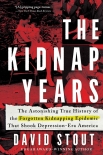The Kidnap Years:, David Stout [readict .txt] 📗

- Author: David Stout
Book online «The Kidnap Years:, David Stout [readict .txt] 📗». Author David Stout
The prosecutors’ task was made easier early on the morning of November 15 when Dr. James Seder died.
The case proceeded with remarkable speed. Booth went on trial first. He had no defense, really, as psychiatrists opined that he was not insane. (Just evil, perhaps?) On December 11, 1937, jurors took less than an hour to convict him. Four days later, a judge sentenced him to death.
Perhaps Travis and Adkins hoped for mercy since they had been led into the whole mess by Booth and, well, they were drunk much of the time. Besides, they testified, they really had meant to free Seder, but again, they got drunk.
Jurors were in no mood to show mercy. They took just forty-two minutes to find Travis and Adkins guilty. Knowing that they faced death, the two cried uncontrollably as they were led out of the courtroom.
On March 21, 1938, the state prison in Moundsville, West Virginia, carried out its first executions for kidnapping and the state’s first triple execution in decades. Adkins and Travis went to the gallows first and together, since the scaffold could accommodate two at a time.
Things didn’t go smoothly. As straps were being fastened about their arms and legs, a mechanical malfunction caused the trapdoor under Adkins to open before the noose was in place. He fell eight feet to the concrete floor below, cutting his head. Then he was hoisted back up through the open trapdoor for the final plunge. Both men offered prayers of a sort before they dropped.
A short time later, Booth stood alone on the gallows. He prayed aloud that God would take care of Adkins and Travis. He asked for blessings on the warden and guards and prayed that the Lord would receive him. Surely, he knew that he was asking for more mercy than he had shown to an old minister.
Then he dropped to his death.
CHAPTER FORTY-SIX
THE LUCKLESS ONE
Holdenville, Oklahoma
Wednesday, October 24, 1934
He had come of age in the Dust Bowl of Oklahoma. He had never had much in life, and he didn’t expect much. He was a career criminal, though not a vicious one, and his name was Arthur Gooch. In the autumn of 1934, he was twenty-six, and he was soon to become one of the saddest figures of those hard times.
On this particular Wednesday, he and another prisoner, Ambrose Nix, broke out of the jail in Holdenville, a little town in the east-central part of the Sooner State, along with several other prisoners. Gooch, who had been jailed to await trial on robbery charges, and Nix stole a car, drove south to nearby Texas, pulled off a robbery in Tyler the next day, then hoped to stay out of sight for a while.
On November 26, they pulled into a service station in Paris, Texas, just south of the Oklahoma border. The car they had swiped had a flat tire. Wherever they were going, they needed good tires to get there.
Maybe it was the flat tire, or maybe Gooch and Nix looked like the nickel-and-dime criminals they were. For whatever reason, two local cops who happened to stop at the station were suspicious. They approached Gooch and Nix to check the papers for the car. Immediately, there was a struggle. Nix knocked one of the cops into a display case. The glass on the case broke, and the cop suffered a minor cut on one hip. Nix managed to pull out a pistol, and he ordered the cops into the back seat of their patrol car. With Nix training his gun on the cops, Gooch went to the stolen car and retrieved the several weapons he and Nix had acquired.
With Nix at the wheel and Gooch pointing a gun on the cops in the back seat, the patrol car sped off—fatefully, it would turn out—across the state line and into Oklahoma, first into Choctaw County then into Pushmataha County. The fugitives stuck to the back roads. The next night, some forty-two hours after seizing the cops, Gooch and Nix let them go after Gooch had dressed the hip injury one cop had sustained.
And off went Nix and Gooch again, not to be heard from until late December.
On December 22, several bandits robbed two banks in Okemah in east-central Oklahoma, netting about $17,000. Not surprisingly, the area was soon teeming with local, state, and federal lawmen. There was a farm whose owner was suspected of happily shielding criminals for money, so police and federal agents staked out the place, thinking the bank robbers might stop there.
During the stakeout, a strange car drove up. Two lawmen drew their guns as two men got out of the car. Gunfire was exchanged, and one of the men who had just alighted from the car fell dead. He was not one of the bank robbers. He was Ambrose Nix. The other man was Arthur Gooch, who surrendered and was soon on his way to Muskogee, Oklahoma, where he was charged with automobile theft and with violating the Federal Kidnapping Act, since the police officers they had seized weeks earlier had been taken across state lines.
No doubt, Gooch expected to go back to





Comments (0)